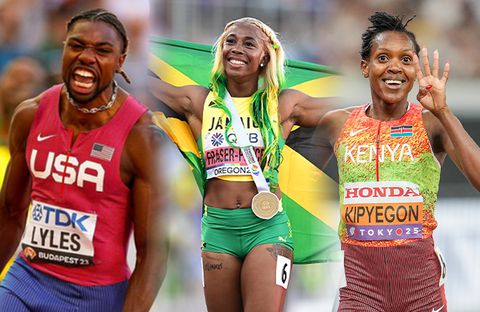
Track and field has always been one of the purest and most exciting forms of sport — a showcase of speed, power, endurance, and human excellence. Yet in recent years, many have argued that athletics has struggled to maintain the same global popularity it once enjoyed during the golden eras of icons like Usain Bolt, Carl Lewis, and Florence Griffith Joyner. However, according to several sprint legends and analysts, the future of the sport can still be incredibly bright — if today’s superstars such as Faith Kipyegon, Noah Lyles, and Shelly-Ann Fraser-Pryce continue using their platforms to captivate audiences beyond the track.
Former sprint champion and athletics ambassador Michael Johnson recently emphasized that the key to revitalizing the sport lies in storytelling and visibility. “People don’t just follow results; they follow personalities,” he explained. “Fans want to connect emotionally — they want to feel part of an athlete’s journey, struggles, and triumphs. The talent is already there. What’s missing is the global spotlight.”
Few embody that superstar appeal like Noah Lyles, the charismatic American sprinter who combines showmanship with sheer dominance. His confidence, sense of style, and willingness to speak his mind have drawn attention from younger audiences who might not typically watch athletics. Lyles understands that entertainment is part of modern sports culture. His ability to blend pop culture, fashion, and sprinting has turned him into a crossover star — someone who makes track and field cool again. If more athletes follow that model, the sport’s reach could multiply across social media platforms and into mainstream entertainment.
Then there’s Faith Kipyegon, the Kenyan middle-distance queen whose humility and consistency have made her a global inspiration. In an era where short-term fame often overshadows hard work, Kipyegon represents longevity, grace, and excellence. Her record-breaking performances in both the 1500m and 5000m have earned her comparisons to legends of the past, but it’s her quiet dignity and authentic storytelling that touch hearts around the world. Through media engagement, motivational talks, and documentaries about her journey, Kipyegon could help bring millions of young African girls into athletics — showing them that greatness is born from discipline, not just talent.
Meanwhile, Shelly-Ann Fraser-Pryce, the Jamaican sprint queen, remains a global symbol of perseverance and motherhood in sport. Competing — and winning — after becoming a mother has broken stereotypes and expanded the narrative around women in athletics. Her bright wigs, infectious smile, and powerful statements about resilience have made her one of the most beloved figures in sports. As she nears the twilight of her career, her transition into mentorship and advocacy could ensure that her influence continues long after she retires from competition.
The sprint legend concluded by noting that if these athletes — and others — continue leveraging social media, engaging in global campaigns, and uniting through events that celebrate their diverse cultures, track and field could once again command global attention. “Athletics doesn’t need reinvention,” he said. “It needs celebration — of its stars, its stories, and its spirit.”
With icons like Kipyegon, Lyles, and Fraser-Pryce leading the charge, the world of track and field is poised for a renaissance — one driven not just by speed on the track, but by connection, charisma, and courage off it.
Be the first to comment